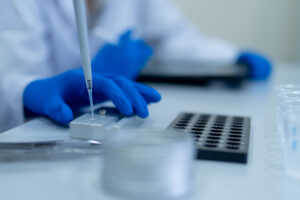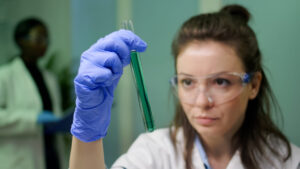Genetic diagnosis for rare diseases can be a complicated process.
Genetic diagnosis for rare disease
Genetic diagnosis for rare diseases is a process, sometimes also referred to as a diagnostic journey. The process aims to find answers for patients, either about their genetic health, their risk for developing a rare disease, or which specific rare disease they might be at risk for.
Genetic diagnosis for rare disease: the process
Genetic diagnosis for rare diseases is a multi-step process that should include genetic counseling, as well as genetic analysis and testing.
Genetic counseling & genetic diagnosis for rare disease
This is the initial stage of the genetic diagnosis of the rare disease process. But more than that, it should also accompany a rare disease patient throughout the entire diagnosis process.
Genetic counseling is an invaluable support service, led by professional genetic counselors, that provides important information and knowledge, as well as recommendations and support, to rare disease patients and their families.
Genetic counseling aims to improve the accuracy of the diagnosis process while supporting patients emotionally along the way. It is led by professionals who can act as a bridge between genetic experts and patients, translating medical and genetic information in a way that patients can understand.
Genetic counseling aims to empower patients when it comes to their genetic diagnosis. With information about the causes and symptoms of genetic syndromes, but also with comprehensive information about the types of genetic testing available, what they involved, and what they might be able to tell a patient about their genetic health.
Genetic counseling has traditionally been a service that takes place in person. However advancements in technology and a drive to make it more accessible to more people are increasingly pushing genetic counseling online.
Genetic analysis and testing
Genetic analysis and testing is an important part of the genetic diagnosis for rare disease process. It involves understanding more about an individual’s genetic health, either through invasive or non-invasive screening methods, to understand if they are either a carrier of a genetic mutation or a rare disease patient themselves.
There are different types of genetic analysis and testing. Some are non-invasive and might involve facial screening to identify markets of rare symptoms, for example. Other forms of genetic testing might involve taking blood samples to sequence and understand a person’s DNA.
Genetic testing takes many forms. Carrier screening involves testing an individual’s DNA, to understand if they are carriers of genetic mutations, which might have implications for the health of their future children, or themselves, depending on how each mutation is inherited and causes a rare disease.
Genetic testing conducted during pregnancy can identify if a developing fetus is at risk of developing specific genetic syndromes. Some types of testing during pregnancy can accurately confirm a rare disease in an infant. In the US all newborns undergo genetic screening at birth, to check for Phenylketonuria (PKU) amongst other possible syndromes. Genetic testing is increasingly a part of standardized pregnancy care in many countries.
Genetic testing is more accurate when combined with genetic counseling. The more that is understood about a patient’s medical history and health, the more targeted genetic testing can be, and the more accurate the eventual diagnosis.
For insights into the genetic diagnosis of lysosomal storage disorders, see our dedicated article on Genetic Diagnosis for Lysosomal Storage Disorders.
Improving genetic diagnosis for rare disease
Genetic diagnosis is a complicated process. Genetic testing is more available than ever before, and online genetic counseling is doing its part to make this crucial service accessible to more people.
These are important steps forward in the drive to improve accuracy within genetic diagnosis and analysis. Misdiagnosis is still too common for many rare disease patients, and many also face delayed diagnostic journeys that are delaying their access to important support and care.
The focus on improving genetic diagnosis moving forward should be on improving accessibility to genetic counseling, genetic analysis, and testing.
It should also focus on ease of use, and putting the patient in control of their genetic health and diagnosis. Empowering patients, with information and knowledge, is very important. The more we all understand about rare disease, their causes, and symptoms, the better equipped we are to help those with a diagnosis manage their condition long term.
With the help of genetic counseling, a professional can assist you and your family to detect symptoms that can potentially be causes of a rare genetic syndrome including Adams-Oliver syndrome and more. This will be a step forward in the process of providing a diagnosis for you or your loved one.



